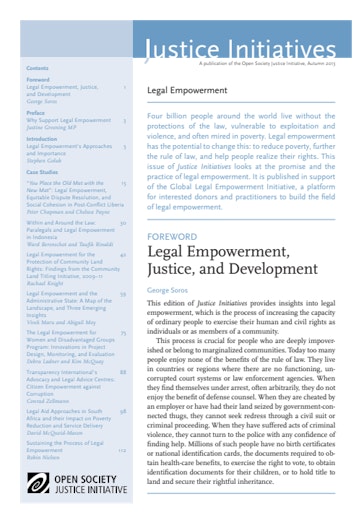Justice Initiatives: Legal Empowerment
From the Foreword by George Soros:
“This edition of Justice Initiatives provides insights into legal empowerment, which is the process of increasing the capacity of ordinary people to exercise their human and civil rights as individuals or as members of a community.
This process is crucial for people who are deeply impoverished or belong to marginalized communities. Today too many people enjoy none of the benefits of the rule of law. They live in countries or regions where there are no functioning, uncorrupted court systems or law enforcement agencies. When they find themselves under arrest, often arbitrarily, they do not enjoy the benefit of defense counsel. When they are cheated by an employer or have had their land seized by government-connected thugs, they cannot seek redress through a civil suit or criminal proceeding. When they have suffered acts of criminal violence, they cannot turn to the police with any confidence of finding help. Millions of such people have no birth certificates or national identification cards, the documents required to obtain health-care benefits, to exercise the right to vote, to obtain identification documents for their children, or to hold title to land and secure their rightful inheritance.”
The 11 chapters in this issue of Justice Initiatives examine legal empowerment in its many manifestations. Introductory essays by George Soros and Justine Greening MP, of the UK’s Department for International Development, argue for the importance of legal empowerment. Stephen Golub, who coined the term “legal empowerment,” surveys the many approaches being taken to it around the world today. And eight case studies look closely at legal empowerment in action, from paralegals resolving disputes and reducing conflict in Liberia to villagers fighting for their land in Indonesia, to an NGO using citizen-generated data to fight corruption.
In combining overviews of legal empowerment with detailed portrait of its impact on the ground, this edition of Justice Initiatives makes a compelling case for the effectiveness of legal empowerment and the need to expand its reach.
Topics
- Climate Justice
- Digital Rights and Fair Elections
- Discrimination and Racial Justice
- International Crimes
